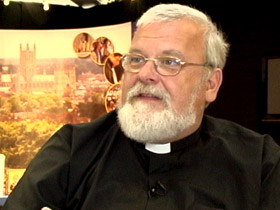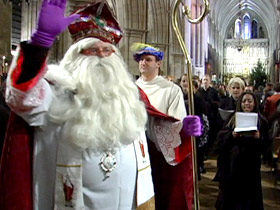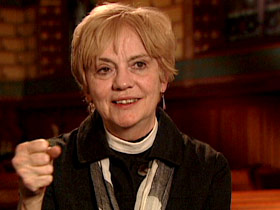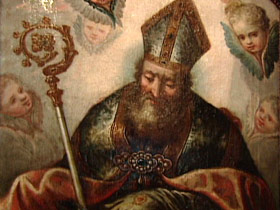Read and watch more of Kim Lawton’s November 25, 2009 interview with Matisyahu in Washington, DC:
What do you think the appeal is of your music?
It’s good music.
The deeper messages—do you think that makes it rise above in some way?
I think that’s one aspect of it, yeah, yeah. I mean in music there’s content. Then there’s the actual music or the sound, you know, and I think that people listen to music for a variety of reasons. I think the people that listen to my music listen to it for the experience that they have, you know, whatever that is, when listening to the music, and part of that might be the music itself. A part of it might be the lyrics or the content. For me, it’s not really about—it’s hard to decipher between the two. It’s kind of one thing, you know, and I guess in today’s music that you hear a lot today or always, sometimes the lyrics are very shallow and very sort of just kind of filler, you know what I mean? I don’t feel that’s the case, really, with my lyrics, you know. I try to tell a story or I try to bring forth some type of idea or a feeling, you know, through the words and the music.
 Do you have an idea or a message or something that you want to put out, or does it just sort of happen organically because it comes from some place deep inside of you that just all comes together?
Do you have an idea or a message or something that you want to put out, or does it just sort of happen organically because it comes from some place deep inside of you that just all comes together?
Yeah, it’s sort of the lyrics that I write are sort of just a reflection of my work that I do, I guess, my spiritual work, you know, emotional, intellectual, or whatever, my inner work, whatever I have going on, what I’m working on, the project that I’m working on, and then that’s what I deal with in my music, because it’s really one thing for me. Like my life is not separate from my music, you know. It’s not like a day job that I leave and go home. It’s my—who I am as a person, and how I’m, you know, trying to grow, come closer to God, be a better person, whatever it is, is all totally bound up with music, how I see the world and experience the world, how I put it out there and take it in. It is all kind of one thing.
I’ve asked several other artists from different traditions who are spiritual or religious to describe for me or talk a little bit about this connection between music and spirituality and a relationship with God. How does that work together for you as an artist and a person of faith and spirituality?
Well, I think that listening to music or creating music is a spiritual undertaking, so the process of creating music, you know, involves listening. It involves sensitivity, it involves humility, you know, and then also it’s something which is higher than words. It evokes emotion, and it has the ability to, I think, really transport people someplace. To take people out of—to put people into the moment, you know, I guess, to kind of cut away distractions and have people experience themselves, you know, or community, like at a concert, for example, you know, there is a certain energy that’s created, you know, and that doesn’t require even an artist who has a spiritual tendency. You know, at a rock show, there is a certain energy that is created.
Is it heightened if the spiritual dimension is there? It’s almost like a transcendence or something. Does that get heightened if the spiritual enters into the mix?
Yeah, I think it can. It depends. You can have an artist that is spiritually minded but is not a great musician and is unable to create that energy, you know. You have some artists, take an artist, for an example just because he’s the perfect artist for this, like Michael Jackson, you could argue as to whether or not it’s really spiritual music. I mean he had songs that were certainly meaningful and powerful, and he certainly had some type of spiritual impact on anyone that really listened to his music. But I don’t necessarily know if he was coming at it from that place. But when he would perform, just the way he would move through music or sing you could say that that was affecting people. I think that if you have musician; let’s say, here’s an example, like Bob Marley, who is like a great musician and powerful presence and also with a spiritual message, yeah, you have the ability to create something really amazing. And those iconic figures like John Lennon or Bob Dylan or—I don’t know if you would say they were spiritual, but they were certainly infusing their music with so much meaning, you know, so certainly in a sense, yeah.
 Let’s talk a little about the CD. You’ll be doing a lot of the songs from the “Light” CD. What were some of the inspirations for you as you were putting that together?
Let’s talk a little about the CD. You’ll be doing a lot of the songs from the “Light” CD. What were some of the inspirations for you as you were putting that together?
The way the process started for me was I sort of have a friend who is sort of a teacher sort of. He hates to be called a teacher, but I don’t know what else to call him, but a man who we have a lot of conversations, and we study together, and we started out by really delving into a rabbi named Reb Nachman from Breslov Hasidic movement in the 1800s, and he had some very sort of controversial and sort of edgy ideas about God, about spirituality, so we really started by studying his works, and there were two works in particular that became the backdrop for the record. One was a dream that he had, which I don’t know if it has a name, I think it’s just called “The Dream.” He mentioned that it was sort of like all of his teachings, his life were sort of found in that dream, and then the other one was the story of “The Seven Beggars.” Along with some of his teachings he has a safe or a book called Lukutei Torah, and we took that, and there was also some teachings from the Alter Rebbe that we incorporated. Alter Rebbe was the Shnuer Zalman of Liadi, was the first Chabad Rebbe; also around the same time. They were contemporaries and actually had some pretty stark difference of opinion about God and how to serve God, so we began sort of comparing and contrasting and, I guess, that became in a big way the backdrop for the record—a lot of the ideas, you know.
Give me an example, maybe, of how that came to fruition in some of the songs.
Like how it worked exactly?
Like that was the backdrop, but then how did some of those teachings, those ideas about God that you were studying and that that you were thinking and learning about, how did that then get into one of the songs?
So the process was kind of really pretty interesting, actually. It was like basically about a year of us discussing these things and, you know, emails back and forth and questions, and then it became pared down into writings, basically, sort of longer writings, sort of like pages and pages on each idea, you know, and basically “The Seven Beggars,” for example. There’s each beggar really represents another idea in the service of God, and so let’s say we would take one of those beggars, like the blind beggar, and we would start with that idea and then we would sort of have this thing, and then we would pare that down. Ephraim [Rosenstein] would write it down from sort of a pages and pages on it to, like, a very intuitive language, almost like poetry, like very more instinctive, emotional, maybe 15 lines or something like that. And then when I went to write my record I had this packet of ideas with maybe about 20 ideas, each about like anywhere from 10 to 30 lines or so, and I kind of kept it with me wherever I was writing, and then there was this whole backstory of all, you know, all the work we had done leading up to that, and when I would go to write music, whoever I was writing music with we would work on a track, let’s say, and then basically when the track was not complete but on its way, I would sit and listen to it, and then I would kind of read through these ideas and feel like which one felt like the right idea for that music, and then I would start to write lyrics based on those sort of paragraphs, and sometimes I would take actual words from there, sometimes I would change and develop, because a lot of songs are more wordy, you know, and that’s kind of how the songs came into play. Also, what we did was, around that time, I started to sort of like I had done some things, like I did the John Lennon compilation for Darfur, and I was involved in a movie that was made about sex trafficking in Asia, and so I started to, like, get this more awareness about child atrocities around the world, child soldiers, sex slaves, and the whole story of “The Seven Beggars” is about two children that are lost in a forest. So, like, you have this idea to try to incorporate more modern-day issues into this fairy tale kind of story. And we wrote this fictional story, sort of like “Remake of the Seven Beggars,” as if it was, like, two child soldiers in Africa, and so there was at the same time also this story about these two children, child soldiers, sort of running through the desert, basically, and how they come into contact with like these different ideas, and so initially the record was going to be like a total like story, and then I kind of decided to pull away from that, but I still used like the backdrop of that story about those children throughout the whole entire record.
 Those teachings are infused throughout the all the music, it sounds like.
Those teachings are infused throughout the all the music, it sounds like.
Yeah.
Talk about the theme of light and how that plays into it for you.
Well, in a nutshell there’s Kabbalah. The Kabbalah talks, Jewish mysticism talks about the creation of the world, and the basic idea is that God when he wanted to create the world withdrew His light from the center of His being. His light is like all being. Everything is consumed within God. So in order for Him to create like the other, He had to sort of pull out His core being, pull like out His light from the center, and then He created this sort of void or this sort of empty space within, and then the world basically exists inside of that empty space. And the light is surrounding it like on the outside, and I find that to be really, really, really—I find it to resonate like very much with like my experience in the world, you know, that in any spirituality basically, Eastern religion or Judaism or any tradition, there’s a feeling of sort of having to get in touch with the empty, withdrawing of the self. In Judaism it is called bittul. It’s sort of roughly translated as humility, but the ability to almost like sacrifice or to eliminate some aspect of yourself in order to make this space, and then the idea is not to totally get lost in that darkness, but to be rooted in it with the sense there is above all of it there is this surrounding light.
One song I wanted to talk about specifically on the CD is the one getting a lot of play on NBC and the Olympics, “One Day.” How did that come about? What do you think about that song becoming an anthem for promoting the Olympics?
It’s really great in the sense that, I mean, there’s—it’s a very sort of simple song, not—it was written after all of sort of—the record came later, and it was just sort of went into the studio and I didn’t put too much thought into it and just wrote, and there were co-writers also, it wasn’t just myself, but just a basic, sort of, you know, hopeful song, you know, just to in some ways naïve, but just tap into that sort of just raw place of hope, I guess, and that is sort of what the Olympics is about to an extent, too—people, countries coming together that have differences, kind of rising above that.
How do you see your music, even the spiritual underpinning of it, evolving?
Well, I would say that when I sort of, the first record that I made, ”Shake Off the Dust,” which became “Live at Stubbs,” because that was a live, pretty much live version of those songs, was made while I was in yeshiva, and I was, you know, not raised religious, and then I went to college, and in my last year of college I became religious and went to move to Brooklyn into like a full religious environment and pretty much spent the days studying Torah for about a year and half. I didn’t leave much, and I was just right there. So the first record I made was pretty much made on Fridays, was like the one day you could leave the yeshiva and you could go, and what people would do was to go into the city, into New York, and find Jews, basically working in businesses or on the street and talk to them about Judaism. Try to get them to do mitzvahs and stuff like that, put on tefillin, light Shabbos candles, that kind of thing. So what I started doing was going to a studio, to a friend of mine’s studio, and that’s when I started working on the record. I had been sort of removed from my creativity, because up until that point all I did really was write lyrics and listen to music. What is that, left brain? Right brain? So anyway when I went to yeshiva I tried really just to be focused and learn Torah and then, you know, when I would learn I would find lines in the Psalms, or in the Tanya, which was the main sort of book in Chabad, the main ideological book, that I found really beautiful or inspiring or—and all of my creativity was kind of festering and bubbling, and then on Friday I would go and I would just basically take one of those lines, one of those ideas, and try to develop a song around it with a vision, you know. And that’s really how that first record was made. The first song that I made was even before that, before I went to yeshiva, that was the first version of “King Without a Crown,” which was my song that did really well on radio, and that song was prior to all of that, and that was at the time when I was becoming religious, and it was really just about very, sort of, you know, about my experiences up until that point, just basic self-help type, you know, although that’s not a great word to use, but just like my lessons that I have learned, and that song was written in maybe twenty minutes, you know. That’s a lot of words. So like when the track was going I just wrote all of my, you know, I write more like, you know, a rapper would write at that point, the flow was more like writing a rap, you know, writing a rhyme, and so it would just come out in that form, and it was all about basically devotion to God and belief, faith, you know. The new record was more developed, sort of the next stage in my spiritual progression, and therefore it was, you know, more time spent on the ideas. The first one was kind of more like “I love this” or, you know, like that first dating someone for the first time versus like a relationship that’s been developed, God love-hate relationship, you know, you’ve been through something with somebody, and you have difficulties and problems and you don’t understand each other and you try to work through it. That’s more of what my relationship with Judaism developed into versus the first, which was total blind devotion, just falling in love with it.
 I want to ask you about that. Maybe you could talk a little bit more about how that spiritual journey has changed, and moving away from Chabad and now where you are with all of that.
I want to ask you about that. Maybe you could talk a little bit more about how that spiritual journey has changed, and moving away from Chabad and now where you are with all of that.
Well, basically, you know, like I was raised not very religious, but I went to Hebrew school, with some Jewish identity, and really my first, like, interaction with spirituality I would say was through the music of Bob Marley and hearing all the references to the Old Testament and to Judaism in the context of reggae music and getting high and everything that came along with that. And so that was obviously for me, as a fourteen-year-old, very accessible and very interesting and inspiring to me versus, you know, the typical Hebrew school experience being bland and unrelated to my life as a kid. So that was the first thing. It was like wow, why is Bob Marley singing, taking all these quotes from the Psalms? I know that I’m Jewish, that I have some kind of connection with that, Psalms and Old Testament, and it made me intrigued to start to get interested in my heritage, really, for me, and then along with that I went on this trip to Colorado, and it was like a wilderness trip, and I think for the first time when I was out in the wilderness I felt that feeling of that void space that we were talking about before, that feeling of emptiness, and delving into that and trying to figure out what that was, you know. Then right after that trip I went to Israel, and so in Israel I guess I started to feel an exposure to Judaism beyond the scope of what I had been brought up with or used to seeing, in the sense that seeing, you know, so many different types of Jews, it was sort of like Malcolm X, you saw the Malcolm X movie when he went to wherever it was, Mecca, and he was used to seeing like only one type of Islam. Then he went there and he saw these different people, you know. It’s the same experience for Jews that go to Israel, when you grew up with one strain of Judaism and then you see all around you so many different types of Jews relating to Judaism in different ways, but Judaism is at the core of it all. It’s not like in America, where it’s sort of the afterthought or just some part of, you know, your identity. There it’s alive and very real, and that had an impact on me. So then I came back to America, went back to high school, and that winter I went to a Phish concert for the first time. I had LSD for the first time and totally had just an amazing experience with music and with, you know, experiencing a whole other dimension of life, a core dimension of experience, what things mean really, you know, in so much of a deeper way than I had ever experienced anything. So by that point I realized that’s what I want to do. I don’t want to live like—I don’t want to be normal anymore. I want to go for this experience, and then the next, I guess, time between 16 until the time I was about 22, when I became religious, so about six, seven years became for me all about how to reach those depths, you know, or heights, and whether it could be done through drugs or sobriety or religion or, you know, or being in the wilderness, Israel, whatever it was, I sort of tried to find music. That’s when the journey started for me, and I got to a certain point I think where I felt very stuck and very, like, unable to get to that place, you know, to get back to that experience, and I knew that it had to be done without any crutch, or any substances and drugs or anything like that. So I really felt that the way to do it was to, like, really delve into my spiritual tradition, the heritage, and even though I didn’t know that much about it, just from seeing pictures or, you know, little things that I had read, I realized that there was something to that, and that was a part of me, that whether I would agree with it or not agree with it, it’s something that’s alive in me, it’s like in my DNA, and it’s a part of me, so rather than, I guess, exploring other religions and things, I figured I would start with this, the way that I am and the state of being that I was in at that time, when I was 22 or whatever, or 21. I really jumped into it full-force. The first thing was through Shlomo Carlebach and his music and his shul on the Upper West Side, and I got really excited about being Jewish. I started wearing a yarmulke, and I loved all of a sudden the fact that I had this identity. When I was on the train or walking down the street it felt so amazing to take on feeling of when other people see you it’s a certain thing, not just what you believe, who you are, and also all my life I felt very much on the outside, you know, and being Jewish, it fit in with my experience, you know. Everything kind of fit together.
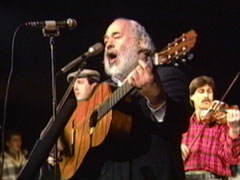
Shlomo Carlebach |
So I really got into that, and then I met a rabbi, a Chabad rabbi who had come from similar experience as me, like Grateful Dead and very young, charismatic, and funny and had gone through all the drugs and stuff, and I saw him in the way he was living, and he had like already two kids. He was living in the Village like doing outreach to basically Jews, to young Jews and stuff, and he was an extremely just fun person, lighthearted person to be around, and I am not that way. I can be—everything to me is, like, you know, so heavy, like this decision to be religious or not be religious, so I really got close to this guy and moved into his, you know, went through some hard things with my parents and then moved in with him and his family and slept on the couch in his two-bedroom apartment for about four to five months, and we became very good friends, and we would do these ridiculous things, like on Shabbos walk three miles to the mikvah and, you know, wake up at three o’clock in the morning and try and say the whole book of Psalms and, then, before morning prayers, you know, I would walk to different shuls and, you know, from Brooklyn to Manhattan over the bridge, and I started right away, got indoctrinated in the Chabad thinking. Right off the bat I started going. One rabbi asked me to start putting tefillin on somebody, a Russian kid who had been injured in the hospital. So I started going, started going everyday to the hospital putting on tefillin on this kid, and I was just starting to put tefillin on myself, you know. I was explaining to him you have to put on tefillin, this is why you have to do it, you have to start keeping Shabbos, and so I started to take on this whole other persona, personality that wasn’t really me, and just trying to—then I moved to Crown Heights. I got really into it. It was an interesting experience for me, because in some ways it was very—there was a lot of light, it was very purifying. I really was able to get past a lot of the things that I hadn’t been able to get past before, and I, you know, cut out so much stuff, you know, that is, not necessarily healthy things, things like, you know, whatever it is, you know, TV and, you know, any type of partying. I got really focused and tried to really, you know, purify myself. And on the other hand it was a very, like, dark experience as well, because I really sort of got into, almost into this whole loss, really, the line of where you draw when you’re trying to kind of lose yourself as to where it’s healthy and where it’s you start to become schizophrenic, you know, or totally lose your mind almost. I was really walking that line very, very much, and then I found, basically, I started doing my music. I had some people who really believed in me early on and kind of got me started doing my music, basically, and then I found this really amazing therapist, and we started really talking, who is the guy who became the co-writer with me on this record and stuff. Later we became just good friends, and I started to reevaluate everything that I had taken as ultimate truth, you know, and to pull back and say okay, that it’s time to start now reevaluating everything, questioning everything and not accepting everything as blanket—really reevaluate all the decisions I had made and to kind of reemerge, bring myself back into the picture and make decisions for myself based on what seemed right and what was wrong, and I was lucky to have this friend and guide to really help me to do that, and that process has continued, that balancing process of when you are dealing with religion and when you are dealing with ultimate truth, the idea of ultimate truth, or an ultimate idea is like such a little bit shady, dangerous place to be, and on the other hand you see in, like, American society, you know, in Western society, the total rejection of that based on history with whatever it was, Communism, Nazism, whatever it was. Anytime there was an ultimate idea it usually ended up not working. So Western society has been very much, is very much about not having ideas. At the same time, you can see that doesn’t really work in a lot of ways also, or in my experience it didn’t. So it’s this balance, of kind of going back and forth and trying to figure out, continually and always will be, finding the right questions, not having the answers. It’s funny, because you find that people—religious, nonreligious—everyone has their answers, and people are so quick to give these answers, and it’s really, for me, my whole spiritual process or growth process is all about, sort of trying to eliminate the answers within myself and be okay with being in the question, in the question mark, in the nothing, in the void space, and trying to find the right questions.
Doing this balancing in your personal life, is there a sense that also happens professionally? Is there a struggle for you trying to work out your spirituality? Is there a tension? Do you hear from some folks saying, well, maybe you shouldn’t be quite so Jewish overtly in your music or on stage? Or maybe you’d have a broader appeal if you did this or that? Is there a tension or a struggle in how you work that out as an artist, yes, but also as an artist who’s public?
I haven’t really had too many experiences with too many people telling me how Jewish to be or what, career-wise. I mean my career took off based on the fact that in a lot of ways that, you know, there is this very outwardly looking Hasidic Jew doing something totally not typically Jewish, and my song that was on the radio, I mean, the choruses has the word “Moshiach” [Messiah] in it. So you couldn’t really—it would be hard to make the argument. What I had had to deal with a little bit is more from the other side as I’ve sort of grown and evolved in different ways and different things, a lot of people are quick to say, oh, he must be—he’s not wearing his hat anymore. Must be the record company doesn’t want him to wear his hat. That’s always, you know, again it’s amazing how people are so quick to think they have the answers and quick to judge. It’s made me a little cynical about people in general, yeah.
Do you wonder about the layers in your music and who it’s appealing to or who’s getting—I’m sure a lot of people who hear the music don’t make the connection with Rabbi Nachman and all of that. So how do you balance the appeal to the audience when you’re bringing in your specific spiritual ideas?
I ran into this issue a lot live in the sense that, you know, my experience of live music is about a spiritual experience, you know. My experiences that I had were spiritual experiences, and that’s always been what I try to create, you know. And the people that come to my shows are not necessarily looking for that, you know, all the time. A lot of my fans are, a lot of fans from all over the board, such a wide variety of people that come to my shows. And, you know, some people have more of a religious, whether it be Christian or just belief, and they are looking for that at the show. Some people are coming from more of a jam-type of fan experience. Those people are also looking to totally immerse into the music, but I get a lot of like frat kids and young kids and, you know, young religious kids. It’s just their night out. They’re cooped up in yeshiva, and now they are here to be totally wild and crazy. It’s a big challenge to try to take people into that place. I do it a lot differently than maybe how I started doing it. Like at first when I was more early on in my career, when I was coming right out of yeshiva, you know, I felt like I had this sort of specific, like, very small kind of things I’m supposed to say to people, like it’s my duty to say this type of stuff, whereas now it’s more about really trying to achieve that, not to say it, but to achieve that experience through the music and through my own experience that I’m having and how I’m relating it, and it’s grown, and its been five years, and there’s been a lot of growth, and I see, like, the potential to continue to grow so much, to try to become a master at creating and trying to create this experience that people can really tap into something authentic, whether it’s a deep place within themselves or whether it’s God or something bigger than themselves, and yeah, I just—yeah.
The song “Silence” starts with a prayer in the music, but there is also some very real theological wrestling going on there, too. I’m just wondering how that maybe in some way shows or demonstrates your relationship with God, or what that song means to you? It was one that really spoke to me.
Yeah, that song sums up kind of a lot of, I guess, where I am now, you know, with things. This idea like I’ve been kind of been talking about, about allowing yourself to go kind of inwards and to face yourself and to go into that, allow yourself to be, I don’t know, I guess just to get in touch with darker or deeper parts of yourself and not run from them, you know, or avoid them, and that’s a certain aspect to that song, like crushing the fantasy. That’s one of the lines in there, “crush the fantasy.” It actually pertains really quite well to Hanukkah and to light, because one of the lines there which is taken from actually an idea in Chabad or in Chassidus in general, in Torah in general, is the olive oil, like in the Temple. So they would take the olives and crush the olives, and then through that process they would make the olive oil which then go to light the menorah, which is the whole story of Hanukkah, and the light and all of that. So that process has to come through this crushing of the olives, you know, and that’s the same metaphor for crushing the fantasy, and then allowing for, you know, some light to come out of that, which is, I guess, is a really central theme in my music in general, in the record, in the story of Hanukkah, and in the spiritual process in general.
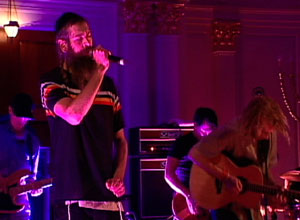
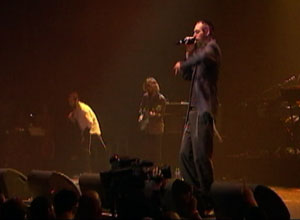

 Do you have an idea or a message or something that you want to put out, or does it just sort of happen organically because it comes from some place deep inside of you that just all comes together?
Do you have an idea or a message or something that you want to put out, or does it just sort of happen organically because it comes from some place deep inside of you that just all comes together? Let’s talk a little about the CD. You’ll be doing a lot of the songs from the “Light” CD. What were some of the inspirations for you as you were putting that together?
Let’s talk a little about the CD. You’ll be doing a lot of the songs from the “Light” CD. What were some of the inspirations for you as you were putting that together?  Those teachings are infused throughout the all the music, it sounds like.
Those teachings are infused throughout the all the music, it sounds like.  I want to ask you about that. Maybe you could talk a little bit more about how that spiritual journey has changed, and moving away from Chabad and now where you are with all of that.
I want to ask you about that. Maybe you could talk a little bit more about how that spiritual journey has changed, and moving away from Chabad and now where you are with all of that.
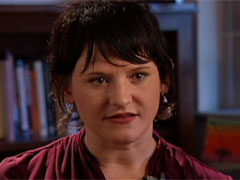

 REID: I had never thought about how true it is that people—I think they think that they’re going to upset you if they mention, you know, the person’s name that’s passed away. It doesn’t. I’d like to hear it. I want to talk about him like he’s, you know, still around, like he’s still important, you know, and not talking about him and not saying his name emphasizes his absence, and lighting a candle in a church, you know, is just very meaningful. And I know he watched me do it.
REID: I had never thought about how true it is that people—I think they think that they’re going to upset you if they mention, you know, the person’s name that’s passed away. It doesn’t. I’d like to hear it. I want to talk about him like he’s, you know, still around, like he’s still important, you know, and not talking about him and not saying his name emphasizes his absence, and lighting a candle in a church, you know, is just very meaningful. And I know he watched me do it. LIONBERGER: I think what happens for them is they get to the transcendent through the physical—the act of canoeing, the act of setting up camp. I like to say it strips them of the barnacles that they accrue throughout their lives and society, and they begin to realize how little they need to be profoundly happy. They are able to simplify, and in that simplification they get a sense of something holy about what surrounds them, a sense of well being and a sense of being cared for and a sense of profound peace, and it’s kind of a hackneyed phrase—“Be in the moment”—but there is something so powerful about it, because that is the moment, in the very present is when God comes to us. It is much easier, I think, for God to get through our defenses when we’re in a wilderness.
LIONBERGER: I think what happens for them is they get to the transcendent through the physical—the act of canoeing, the act of setting up camp. I like to say it strips them of the barnacles that they accrue throughout their lives and society, and they begin to realize how little they need to be profoundly happy. They are able to simplify, and in that simplification they get a sense of something holy about what surrounds them, a sense of well being and a sense of being cared for and a sense of profound peace, and it’s kind of a hackneyed phrase—“Be in the moment”—but there is something so powerful about it, because that is the moment, in the very present is when God comes to us. It is much easier, I think, for God to get through our defenses when we’re in a wilderness. Mr. KROH: We’re not having to lay off a lot of people yet, but we’re cutting back on hours and just trying to hang in there right now. We are taking a lot smaller projects than we used to just to keep everybody busy.
Mr. KROH: We’re not having to lay off a lot of people yet, but we’re cutting back on hours and just trying to hang in there right now. We are taking a lot smaller projects than we used to just to keep everybody busy. GONZALEZ: To stay afloat the church has cut expenses, and Reverend Galloway has volunteered to slash most of her own pay. But despite the belt tightening, every bill that arrives brings a new challenge.
GONZALEZ: To stay afloat the church has cut expenses, and Reverend Galloway has volunteered to slash most of her own pay. But despite the belt tightening, every bill that arrives brings a new challenge. GONZALEZ: In response, Pathways has had to cut staff and fill more positions with volunteers. Houses of worship that face foreclosure and other financial troubles often get into their predicaments for the same reasons that homeowners and consumers do: borrowing and spending too much money when times are good and not being prepared when the economy goes from boom to bust.
GONZALEZ: In response, Pathways has had to cut staff and fill more positions with volunteers. Houses of worship that face foreclosure and other financial troubles often get into their predicaments for the same reasons that homeowners and consumers do: borrowing and spending too much money when times are good and not being prepared when the economy goes from boom to bust. Rev. HARRINGTON: Right now it’s helping us survive. If we didn’t have that right now we would have to massively downsize staff and personnel and do a lot less ministry out in the community than we are doing right now. So it has opened up a lot of doors for us.
Rev. HARRINGTON: Right now it’s helping us survive. If we didn’t have that right now we would have to massively downsize staff and personnel and do a lot less ministry out in the community than we are doing right now. So it has opened up a lot of doors for us.